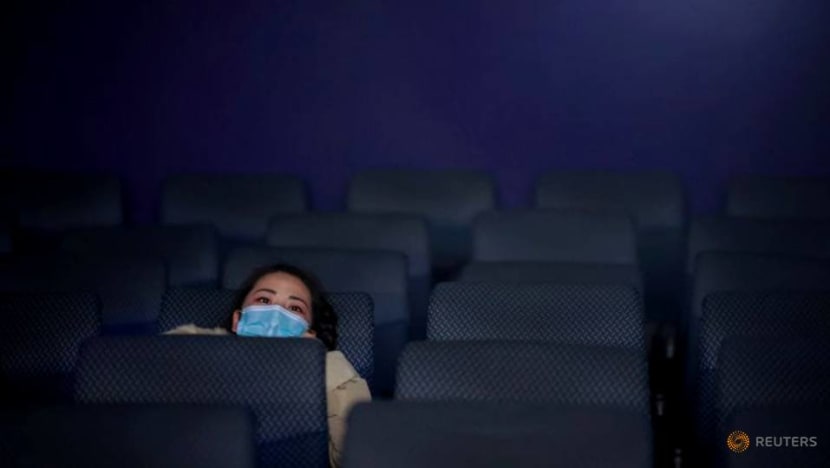Commentary: Is this the end of movie theatres in Singapore as we know it?
Cinemas have had it bad with curbs on audience sizes but there’s little to doubt we will fly back once it’s safe to again, says Nikki Draper of NTU Wee Kim Wee School of Communication and Information.

(File photo: REUTERS/Thomas Peter)
SINGAPORE: Predicting the future of cinemas in the middle of a pandemic can be dicey.
If travel bubbles closing before they open has taught us anything, it’s a lesson about uncertainty.
Full disclosure: I am a streaming enthusiast, with a deep love for television. I appreciate how streaming and cable TV filled a gap and satisfied a need in a pandemic-ridden 2020.
Stuck at home, people turned to them for distraction and found ways to connect with friends and family. But our entertainment options were artificially restricted due to our circumstances.
What happens when we have full choice again? The situation for cinemas in Singapore and globally is concerning. The challenges aren’t small.
READ: Commentary: The slow death of cable TV and why cutting the cord isn’t too painful
READ: Commentary: The rise of streaming and decline of cable TV will benefit consumers most
CINEMA AS THE COMMON COMMUNAL EXPERIENCE
Whether or not movie theatres exist post-pandemic will be shaped by the answers to structural questions not in the control of the average person: First, how governments invest in cinemas and the businesses they interact with. Second, how studios release films once theatres can fill their seats.
Public policy and government assistance will be key to recovery for culture industries, including cinemas.
In September 2020, the OECD published a report looking at COVID-19’s impact globally on culture industries and making a case for the importance of creative sectors in cities’ economic footprint and employment.
Two things struck me. First, cinemas are included in the same category of venue-based arts sectors impacted by social distancing measures as museums and live-performance spaces – places countries are inclined to preserve given their cultural value to communities.

Including cinemas in this group acknowledges the worth of that shared experience of watching movies in social spaces. That recognition is a good foundation that justifies public assistance.
This is especially true in Singapore, which has one of the world’s highest per capita movie attendances, a whopping 18.5 million in 2019 that plummeted to 4.6 million in 2020, according to the Singapore Film Commission.
That’s a big and scary drop. Some of it is surely due to the attendance cap imposed for safety.
It’s no wonder cinema operators lamented when Singapore added restrictions for cinema halls in mid-May. But the decent numbers last year suggest the audience appetite is there.
READ: Commentary: The rise and rise of Netflix in a time of coronavirus
READ: Commentary: Why we missed dining out in Singapore these few weeks
WHEN CINEMAS CLOSE, THE OTHER BUSINESSES IMPACTED
The second important takeaway from the OECD report is how cultural industries operate within an ecosystem. If we let our cinemas disappear, this will impact other businesses.
What could that look like locally? Singapore has 274 cinema outlets. Closing these purpose-built venues would impact commercial real-estate.
These venues also have projection equipment and sound systems that require servicing.
Local distributors and programmers are responsible for identifying, negotiating terms and acquiring films for cinema houses. Local promotion requires marketing, design, website coding and integration of secure online banking and credit card services.

Our cinemas are primarily situated in malls with other stores and F&B outlets. What happens when shopping centres don’t have that foot traffic?
Many local film festivals, like the Singapore International Film Festival, partner with Singapore cinemas. If we lose those screening spaces, we will almost certainly lose some festivals and the regional and independent films they showcase.
Currently, the Singapore Government appears inclined to preserve cinemas until the retail, arts and culture industries can adjust to the new normal. They’ve included cinema operators and their employees in the Jobs Support Scheme.
READ: Jobs Support Scheme extended to retailers, gyms and arts sector
READ: Commentary: COVID-19 has shown Singapore digital arts and humanities are quite the essential service
THE RISE AND RISE OF STREAMING
The second structural factor that will influence Singapore’s cinema landscape post-pandemic are the decisions studios make about releasing films.
Since the introduction of television, there has been a dilution of entertainment consumption – consumers have new choices over how they spend their time and dollars.
The number of options has steadily grown - with streaming services the most recent competitor.
Movie theatre attendance has steadily fallen or fluctuated in response to these challenges. One-off peculiarities have boosted attendance: A good year for quality films or event films like Marvel’s Avengers: End Game or Black Panther which became a social event.
Streaming services experienced massive growth in 2020. But Netflix recently posted a loss of US$20 billion in market value after missing subscriber growth forecasts. The possible cause? The launch of Disney+ which claimed almost 9 million new subscribers in that same quarter.
READ: Commentary: The beautiful, horrifying, worst yet best show ever that is Game of Thrones

Add to that the fact that studios pushed back 2020 releases to 2021 and 2022 with hopes of theatrical premieres. Studios clearly view theatrical releases to be critical to their distribution strategies, even if they envision a larger role for streaming services.
Studios might not have found their formula yet, but Disney+ and the Marvel Cinematic Universe are an interesting possibility of how they might use both platforms to their advantage.
Studios use streaming services to make full use of their intellectual property through television series of backstories or intriguing plot lines expanded from their films. Subsequent films then incorporate the TV details, released in theatres, but eventually returning to the streaming service where everything lives as a collection.
READ: Commentary: Chinese moviegoers may have outgrown Hollywood
WHY WE WILL BE BACK IN NO TIME
So the big question remains: Will people still want cinema experiences? Streaming has made inroads that will be hard for theaters to overcome. One obvious challenge is comfort.
In my house, I have my favourite snacks, no one to block my view or interrupt with their phones, and can schedule watch parties with family. How can cinemas compete with that?
What pleasure can I derive from watching a film in a theatre? One common argument is that the pleasure of cinemas is technical.
Big screens and surround sound give us access to visual and aural quality not available at home. This is a favourite argument of major directors who say that their films are made for cinemas and that’s how they prefer we watch them.
That is true to some extent. But, to me, technical quality is often not the most memorable aspect of watching in a theatre.
READ: Commentary: Cinemas are on life support – and could look vastly different soon
The pleasure was in participating in a live audience, the thrill of being around other people moved in the same way you are at a film’s twists, sad moments and jokes.
It’s our collective gasp when Thanos snaps his fingers in Avengers: End Game or when Spiderman disappeared in Avengers: Infinity War.
We could say cinemas are part of an experience economy that go beyond service delivery. These shared emotions connect us in that specific moment and place, creating something unique that adds to our enjoyment of a film.
There’s no doubt cinemas and streaming compete for our attention. But cinemas are still relevant, especially now.
If you don’t believe me, wait until cinemas can reopen with fewer restrictions on crowds. Most of us will be back in no time.
Nikki Draper is a senior lecturer at Nanyang Technological University’s Wee Kim Wee School of Communication and Information, and faculty coordinator for Perspectives Film Festival.
















